Unit 5 Do you want to watch a game show 教案
- 格式:doc
- 大小:774.05 KB
- 文档页数:22
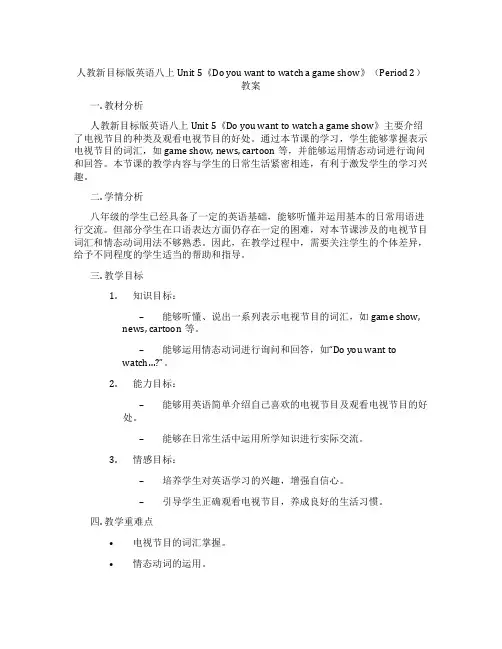
人教新目标版英语八上Unit 5《Do you want to watch a game show》(Period 2)教案一. 教材分析人教新目标版英语八上Unit 5《Do you want to watch a game show》主要介绍了电视节目的种类及观看电视节目的好处。
通过本节课的学习,学生能够掌握表示电视节目的词汇,如game show, news, cartoon等,并能够运用情态动词进行询问和回答。
本节课的教学内容与学生的日常生活紧密相连,有利于激发学生的学习兴趣。
二. 学情分析八年级的学生已经具备了一定的英语基础,能够听懂并运用基本的日常用语进行交流。
但部分学生在口语表达方面仍存在一定的困难,对本节课涉及的电视节目词汇和情态动词用法不够熟悉。
因此,在教学过程中,需要关注学生的个体差异,给予不同程度的学生适当的帮助和指导。
三. 教学目标1.知识目标:–能够听懂、说出一系列表示电视节目的词汇,如game show, news, cartoon等。
–能够运用情态动词进行询问和回答,如“Do you want to watch…?”。
2.能力目标:–能够用英语简单介绍自己喜欢的电视节目及观看电视节目的好处。
–能够在日常生活中运用所学知识进行实际交流。
3.情感目标:–培养学生对英语学习的兴趣,增强自信心。
–引导学生正确观看电视节目,养成良好的生活习惯。
四. 教学重难点•电视节目的词汇掌握。
•情态动词的运用。
•电视节目词汇的准确运用。
•情态动词在实际语境中的运用。
五. 教学方法1.任务型教学法:通过完成各种任务,激发学生的学习兴趣,提高学生的参与度。
2.情境教学法:创设真实的生活情境,让学生在实际语境中学习英语。
3.交际法:注重师生互动,生生互动,提高学生的口语表达能力。
六. 教学准备1.教材:人教新目标版英语八上Unit 5《Do you want to watch a game show》。
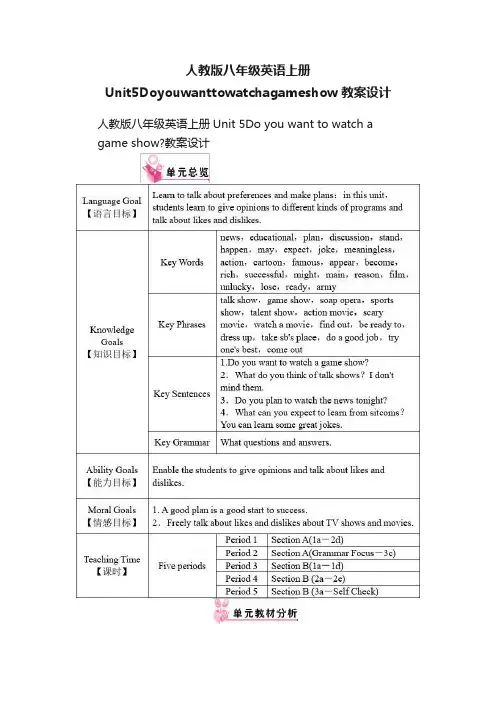
人教版八年级英语上册Unit5Doyouwanttowatchagameshow教案设计人教版八年级英语上册Unit 5Do you want to watch a game show?教案设计本单元教学内容以Do you want to watch a game show?为中心话题,围绕着“谈论喜好和制定计划”展开,学习和运用句式Do you want to watch...?和What questions and answers以及一些描述性形容词,表达对某些电视节目的喜好(评价)。
Section A是基本语言内容的收集和学习,要求学生掌握一些常见电视节目类型的英文名称,如talk show,sitcom,news,soap opera,game show,sports show,talent show等,结合do引导的一般疑问句和what 引导的特殊疑问句,进行简单会话,表达个人对某种电视节目的喜好。
Section B在Section A的基础上,进一步拓展学生基础知识和语言综合运用能力。
Section B 1a在Section A 1a呈现的6种TV shows的基础上增加了comedy,action movie,scary movie等内容。
Section B的教学应侧重于引导学生拾记并运用一些描述性形容词,如wonderful,relaxing,meaningless,enjoyable,exciting,boring等,自由谈论电视节目并表达个人的喜好。
同时,Section B 也安排了一些读、写的任务活动,教师在教学过程中可以整合本单元教学内容,引导学生尝试着写简单的影评。
本单元是实用且学生感兴趣的话题,本单元的学习对于提升学生具体语境下的语言综合运用能力大有助益,同时也可以丰富学生生活,陶冶情操,对学生德育教育也是益处良多。
第一课时Section A(1a-2d)Teaching Goals【教学目标】Key words:news,educational,plan,hope,discussion,stand,happen,may,expectKey phrases:talk show,soap opera,game show,sports show,talent show,find outKey sentences:1.What do you think of talk shows?I don't mind them.2.Do you plan to watch the news tonight?Teaching Key Points【教学重点】The vocabulary:,plan,hope,discussion,stand,happen,may,expect,talk/game/sports/talent show,soap opera,find outTarget language:What do you think of talk shows?I don't mind them.Do you plan to watch the news tonight?Yes. I like watching the news. I watch it every night.Because I hope to find out what's going on around the world.Teaching Difficult Points【教学难点】Use the target language to express likes and dislikes.Teaching Aids【教学工具】An English textbook,a tape recorder,CAI or courseware.Teaching Steps【教学过程】★Step 1Leading inPrepare some things and make sentences.Say,Hello,boys and girls. Nice to see you here again. Today we're going to learn Unit 5.We are going to give opinions. This is a watch. What do you think of it?Ask some students to repeat the two sentences several times.★Step 2Pre-taskPage 33,1a.1.Match work. Ask the students to read the words and the pictures,and then match the TV shows with the pictures (a-g).2.Encourage or help the students to say sth. about the pictures and do the match work.3.Line next to the words “soap opera”.(as shown below) 4.Go on with the others in the same way. Then check theanswers with the students.Page 33,1c.Pair-work. Ask students to practice:What do you think of...?Show the following:What do you think of sitcoms?I love/like them./I don't mind them./I can't stand them./I don't like them.★Step 3While-taskPage 33,1b.Listening.1.Ask students to read the verbs in Activity 1b and write the number from 1a.2.Play the recording for the first time. Let students just listen. Then point out the blank lines where students will write numbers from 1a.3.Play the recording a second time.4.Ask the students to listen to and read after the recording.Page 34,2a & 2b.Listening.1.Ask students to read the phrases in Activity 2a.Then ask them to listen to the conversation and write the answers on the line.2.Check the answers.3.Ask students to listen a second time. Then check the answers and let students read the sentences.★Step 4Post-taskPage 34,2c.1.Focus on the conversation in 2c.Read the instructions to the class.2.Pair-work:Ask students to read the four sentences in 2c.Ask students to practice the conversation using the TV show they know. Say,According to this conversation and using the TV shows you know,make up a conversation. I'll give you five minutes.3.Ask some pairs to practice.Page 34,2d.1.Make students scan the conversation in 2d.2.Teach and then make students role-play the conversation in pairs. In this part,student A will be Grace. Student B will be Sarah. As they talk,move around to monitor their work. Offer language or pronunciation support as needed.3.Have a group of students present their conversation to the class.★Step 5Homework1.Practice reading the conversation on Page 34.2.Do the exercises on Page 30 in students' book.Board Design板书设计Unit 5Do you want to watch a game show?The first period Section A(1a-2d)1.Key vocabulary:news,educational,plan,hope,discussion,stand,happen,may,expect,talk show,soap opera,game/sports/talent show,find out 2.Target language:A:What do you want to watch?B:What do you think of talk shows?A:They're OK.I don't mind them.B:Then let's watch a talk show.第二课时Section A(GF-3c)Teaching Goals【教学目标】Key words & phrases:joke,comedy,watch a movie/sitcom/sports show/gameshowKey sentences:1.Do you want to watch the news?Yes,I do./No,I don't.2.What do you think of talk shows?I don't mind them./I can't stand them!/I love watching them.3.What do you plan to watch tonight?I plan to watch Days of Our Past.Teaching Key Points【教学重点】Target language:Do you want to watch the news?Yes,I do./No,I don't. What do you think of talk shows?I don't mind them./I can't stand them!/I love watching them.Teaching Difficult Points【教学难点】Target language above.Teaching Aids【教学工具】An English textbook,CAI or courseware.Teaching Steps【教学过程】★Step 1Leading in1.Greetings.2.Check the homework by asking some students to read the sentences.★Step 2Pre-taskPage 35,Grammar Focus.Ask students to read the sentences in the grammar box and sum up the sentence structure.Say,Now read aloud the sentences in the grammar box. Then write down the sentence structure in your exercise books.★Step 3While-taskPage 35,3a & 3b.1.Ask the students to complete the blanks in Activity 3a.Say,I would like two students to finish 3a.Fill in the blanks.2.Choose a group to present the conversation.3.Ask students to look through 3b and then finish 3b.4.Choose 2 or 3 students to give their answers. The teacher asks the four questions and the students say their answers separately.★Step 4Post-taskPage 35,3c.1.Ask students to read the information in the left column. Then ask students to write the students' names. Say,Do you want to watch a movie?Fill in your opinions and find who agrees with you.2.Give the students a few minutes to prepare.3.Encourage the students to express their opinions.★Step 5Homework1.Revise the Grammar Focus.2.Do the exercises on Page 31 in students' book.Board Design板书设计Unit 5Do you want to watch a game show?The second period Section A(GF-3c)Target language:①A:Do you want to watch the news?B:Yes,I do./No,I don't.②A:What do you plan to watch tonight?B:I plan to watch Days of Our Past.③A:What do you think of talk shows?B:I don't mind them./I can't stand them!/I love watching them!第三课时Section B(1a-1d)Teaching Goals【教学目标】Key words & phrases:meaningless,action,cartoon,action movie,scary movie Key sentences:John wants to watch talk shows because they're enjoyable. I like to watch action movies because they're exciting.Teaching Key Points【教学重点】The vocabulary:meaningless,action,cartoon,action movie,scary movie Target language:John wants to watch talk shows because they're enjoyable. I like to watch action movies because they're exciting.Teaching Difficult Points【教学难点】1.Enable the students to give opinions and talk about likes and dislikes on certain programmes.2.Help the students learn how to express opinions and tell the reasons using some description words such as educational,enjoyable,boring and so forth.Teaching Aids【教学工具】An English textbook,a tape recorder,CAI or courseware.Teaching Steps【教学过程】★Step 1Leading in1.Check the homework by asking some students to read the sentences in grammar box.2.Then show some TV shows and ask the students to give their opinions using the structure “What do you think of...?”★Step 2P re-taskPage 36,1a.1.Show some new real things such as sunglasses,scarf,wallet,belt,watch and key ring to the students.Say,I have some fashionable things. I bought themyesterday. What do you think of my...?2.Help them to answer:I don't like it./I love it./I don't mind it./I can't stand it.3.Point to some things and ask a student:“What do you think of my new wallet?Then ask another student to point at the first one “What does he think of the wallet?”4.Ask the students to read the pictures. Ask the students to do the match work.5.Ask 1 or 2 students to give answers.★Step 3While-taskPage 36,1b & 1c.1.Ask the students to listen to the conversation.Say,Now let's listen to the tape. We are going to hear a conversation. And you have to write down the words you hear.2.Play the recorder. Then ask the students to write down the words to fill in the chart.3.Further activity:Ask the students to do some pair work in the following way if they can understand the listening material well.4.Then ask students to act out the conversation without the help of the recording.★Step 4Post-taskPage 36,1d.1.Point out the example in 1d.Ask a student to read it.2.Then encourage the students to ask and answer questions about what their parents think of the things in 1a.Say,I think you may like sports show. But I want to know what your parents think of it,please make up a conversation using the things in 1a.★Step 5Homework1.Ask students to remember the new words.2.Practice the structure:What does he/she think of your...?3.Do the exercises on Page 32 in students' book.Board Design板书设计Unit 5Do you want to watch a game show?The third period Section B(1a-1d)1.Key vocabulary:meaningless,cartoon,action movie,scary movie2.Sentences:John wants to watch talk shows because they're enjoyable. I like to watch action movies because they're exciting.第四课时Section B(2a-2e)Teaching Goals【教学目标】Key words & phrases:culture,famous,appear,become,rich,successful,might,main,reason,film,unlucky,lose,come out,be ready to,try one's bestKey sentences:1.When people say “culture”,we think of art and history.2.One of the main reasons is that Mickey was like a common man,but he always tried to face any danger.3.People today expect to see more than just a little mouse fighting bad guys,but many still know who he is.Teaching Key Points【教学重点】The vocabulary:culture,famous,appear,become,rich,successful,might,main,reason,lose,come out,be ready to,such as,think of,try one's bestTarget language:One of the main reasons is that Mickey was like a commonman,but he always tried to face any danger. However,he was always ready to try his best. Today's cartoons are usually not so simple as little Mickey Mouse,but everyone still knows and loves him.Teaching Difficult Points【教学难点】1. Enable the students to read and write about their opinions and their likes and dislikes.2.Help the students learn how to read and write about their opinions and their likes and dislikes.Teaching Aids【教学工具】An English textbook,CAI or courseware.Teaching Steps【教学过程】★Step 1Leading inT:Do you like to watch cartoons?S:Yes,I do./No,I don't.T:What's your favorite cartoon?S:...T:Why do you like it?S:Because...★Step 2Pre-taskPage 37,2a & 2b.1.Project some cartoon animals,such as Mickey Mouse,Donald Duck,T om and Jerry,Monkey King and so on. Ask Ss to talk about them.2.Project these new words on the screen or write them on the board and teach the new words. Ask students to repeat them. And make sure everyone knows the meanings.culture n.文化;famous adj.著名的;appear v.出现;become v.开始变得;rich adj.富有的;successful adj.获得成功的;might modal v.可能;main adj.主要的;reason n.原因;film(=movie)n.电影;unlucky adj.不幸的;lose v.失去,丢失;ready adj.愿意的;be ready to愿意迅速做某事;come out出版,发行3.Make students scan the passage first. Ask students to put a mark in contents that are unfamiliar to them. Then the teacher leads students to learn the passage sentence by sentence. Pay attention to the key words and phrases.4.Students complete the task before 2c.5.Practice reading.★Step 3While-taskPage 38,2c & 2d.1.Make students read the passage again. Say,Before reading,scan the questions in the chart of 2c.2.Students complete 2c.3.Choose 1 or 2 students to give answers.4.Check the answers.5.Pair-work. Discuss the questions in 2d with the partner. First student A asks the questions and student B answers them. Then exchange.★Step 4Post-taskPage 38,2e.1.Ask 2 or 3 students to tell the meanings of the phrases in the box of 2e.Make sure everyone knows each phrase.2.Make students write their own sentences or questions using the phrases.3.Choose 1 or 2 students to read their answers out.★Step 5Homework1.Practice reading the passage on Page 37.2.Do the exercises on Page 33 in students' book.Board Design板书设计Unit 5Do you want to watch a game show?The fourth period Section B(2a-2e)1.Key vocabulary:culture,famous,appear,become,rich,successful,might,main,reason,film,unlucky,lose,come out,be ready to,try one's best 2.Sentences:①When people say “culture”,we think of art and history.②One of the main reasons is that Micke y was like a common man,but he always tried to face any danger.第五课时Section B(3a-Self Check)Teaching Goals【教学目标】Key words & phrases:army,dress up,take sb.'s place,do a good jobKey sentences:She dresses up like a boy and takes her father's place to fight in the army.Teaching Key Points【教学重点】The vocabulary:dress up,take sb.'s place,do a good jobTarget language:She dresses up like a boy and takes her father's place to fight in the army.Teaching Difficult Points【教学难点】Write a movie review.Teaching Aids【教学工具】An English textbook,CAI or courseware.Teaching Steps【教学过程】★Step 1Leading inSay,Yesterday we talked about one famous symbol in American culture—the cartoon Mickey Mouse. Today we'll focus on a movie review about Mulan that is a household name.★Step 2Pre-taskPage 39,3a.1.Scan the words in the box.2.Fill in the blanks in the movie review.3.Check the answers together.4.Practice reading.★Step 3While-taskPage 39,3b & 3c.1.Complete the task in 3b.Write notes for your own movie review.2.Writing practice. Write your movie review using the notes in 3b.3.Choose 1 or 2 students to present the compositions.4.Correct the mistakes.★Step 4Post-taskPage 40,Part 4.Work in pairs to talk about likes and dislikes about these TV shows or movies in the chart. Follow the example:—What do you think of soap operas?—I think they're boring!Write down the description words for each one.★Step 5ExercisePage 40,Self Check.1.Students complete the tasks individually.2.Check the answers.★Step 6Homework1.Review the Grammar Focus on Page 35.2.Do the exercises on Page 34 in students' book.Board Design板书设计Unit 5Do you want to watch a game show?The fifth period Section B(3a-Self Check)1.Key vocabulary:army,dress up,take sb.'s place,do a good job2.Sentences:She dresses up like a boy and takes her father's place to fight in the army。
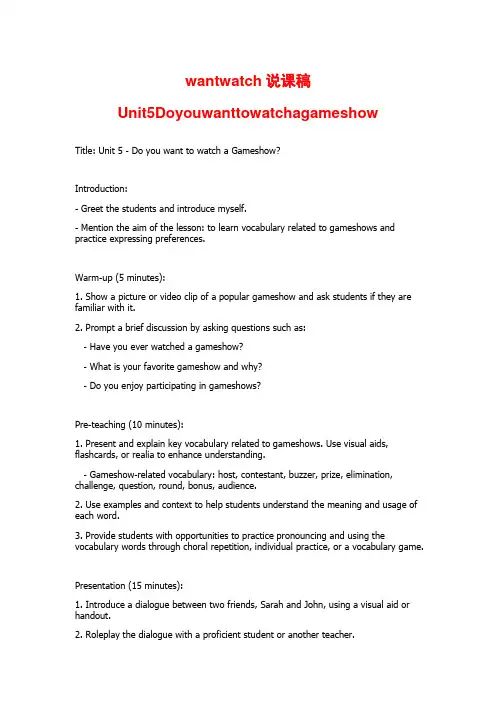
wantwatch说课稿Unit5DoyouwanttowatchagameshowTitle: Unit 5 - Do you want to watch a Gameshow?Introduction:- Greet the students and introduce myself.- Mention the aim of the lesson: to learn vocabulary related to gameshows and practice expressing preferences.Warm-up (5 minutes):1. Show a picture or video clip of a popular gameshow and ask students if they are familiar with it.2. Prompt a brief discussion by asking questions such as:- Have you ever watched a gameshow?- What is your favorite gameshow and why?- Do you enjoy participating in gameshows?Pre-teaching (10 minutes):1. Present and explain key vocabulary related to gameshows. Use visual aids, flashcards, or realia to enhance understanding.- Gameshow-related vocabulary: host, contestant, buzzer, prize, elimination, challenge, question, round, bonus, audience.2. Use examples and context to help students understand the meaning and usage of each word.3. Provide students with opportunities to practice pronouncing and using the vocabulary words through choral repetition, individual practice, or a vocabulary game.Presentation (15 minutes):1. Introduce a dialogue between two friends, Sarah and John, using a visual aid or handout.2. Roleplay the dialogue with a proficient student or another teacher.3. Pause after each line to help students understand the dialogue and give them time to check comprehension.4. If necessary, summarize the dialogue by highlighting the main points.Practice (15 minutes):1. Divide the students into pairs or small groups.2. Provide each group with a list of gameshows (e.g., Jeopardy, Wheel of Fortune, Family Feud, Who Wants to Be a Millionaire?) and a set of cards with preferences(e.g., love, like, hate, don't mind).3. In their groups, students take turns expressing their preferences for each gameshow using the given phrases.- Example: \。
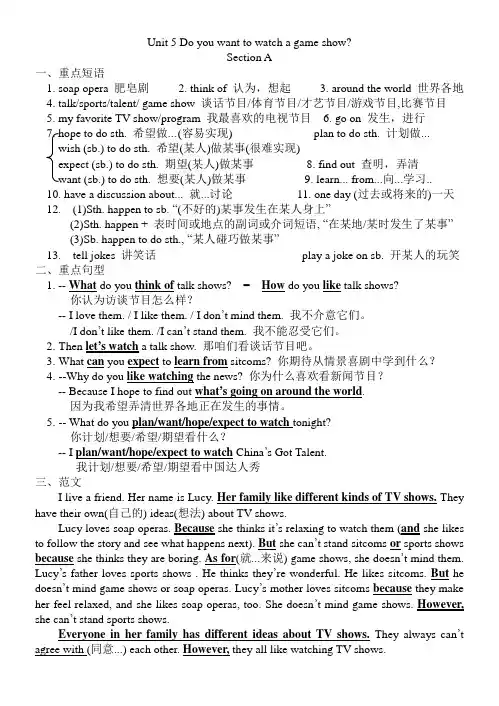
Unit 5 Do you want to watch a game show?Section A一、重点短语1. soap opera 肥皂剧2. think of 认为,想起3. around the world 世界各地4. talk/sports/talent/ game show 谈话节目/体育节目/才艺节目/游戏节目,比赛节目5. my favorite TV show/program 我最喜欢的电视节目6. go on 发生,进行7. hope to do sth. 希望做... (容易实现) plan to do sth. 计划做...wish (sb.) to do sth. 希望(某人)做某事(很难实现)expect (sb.) to do sth. 期望(某人)做某事8. find out 查明,弄清want (sb.) to do sth. 想要(某人)做某事9. learn... from...向...学习..10. have a discussion about... 就...讨论11. one day (过去或将来的)一天12. (1)Sth. happen to sb. “(不好的)某事发生在某人身上”(2)Sth. happen + 表时间或地点的副词或介词短语, “在某地/某时发生了某事”(3)Sb. happen to do sth., “某人碰巧做某事”13. tell jokes 讲笑话play a joke on sb. 开某人的玩笑二、重点句型1. -- What do you think of talk shows? = How do you like talk shows?你认为访谈节目怎么样?-- I love them. / I like them. / I don’t mind them. 我不介意它们。
/I don’t like them. /I can’t stand them. 我不能忍受它们。
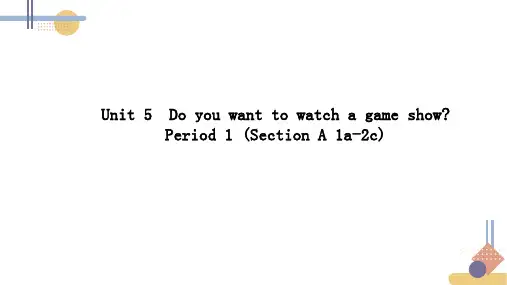
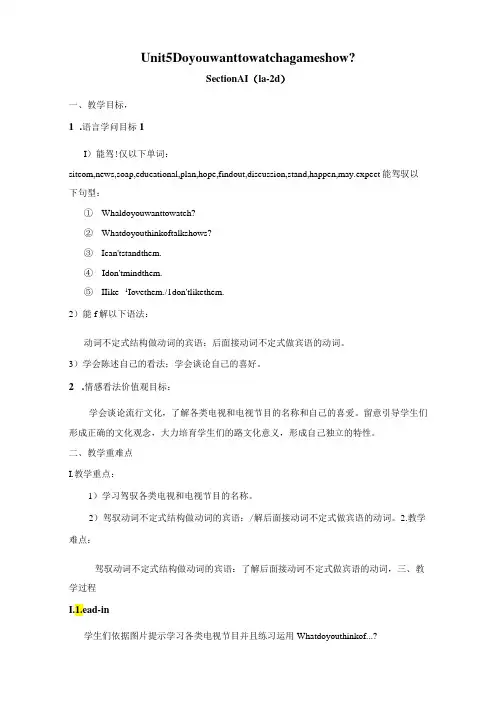
Unit5Doyouwanttowatchagameshow?SectionAI(la-2d)一、教学目标,1.语言学问目标1I)能驾!仅以下单词:sitcom,news,soap,educational,plan,hope,findout,discussion,stand,happen,may.expect能驾驭以下句型:①Whaldoyouwanttowatch?②Whatdoyouthinkoftalkshows?③Ican'tstandthem.④Idon'tmindthem.⑤IIike--1Iovethem./1don'tlikethem.2)能f解以下语法:动词不定式结构做动词的宾语:后面接动词不定式做宾语的动词。
3)学会陈述自己的看法;学会谈论自己的喜好。
2.情感看法价值观目标:学会谈论流行文化,了解各类电视和电视节目的名称和自己的喜爱。
留意引导学生们形成正确的文化观念,大力培育学生们的路文化意义,形成自己独立的特性。
二、教学重难点I.教学重点:1)学习驾驭各类电视和电视节目的名称。
2)驾驭动词不定式结构做动词的宾语:/解后面接动词不定式做宾语的动词。
2.教学难点:驾驭动词不定式结构做动词的宾语:了解后面接动诃不定式做宾语的动词,三、教学过程I.1.ead-in学生们依据图片提示学习各类电视节目并且练习运用Whatdoyouthinkof...?11.Newwords1.carnthenan⅜csoftheTVshows.11I.Game1.引导学生们看Ia中的图片,依据提示依次说出每一部TVShOW的名称∙2.让学生们看图片及Ia中的词汇,将图片与正确的词汇相连。
3.ChecktheanswerswiththeSs.IV. 1.istening1.T:TellSstoreadIhcshowsin(hebox.Makesuretheyknowthemeaningoftheshows.2.PlayIherecordingfortheSs∣olistenandnumbertheshows1-4.3.Playtherecordingagain.CheektheanswerswiththeSs.V.Pairwork1.1.etSslookatthepicturesinthebox.ThenexplainthemeaningofeachexpressiontotheSs.2. 1.etSsreadtheCOnVeralionaftertheIeaCher.TlienletSsmake(heirownconversationusingtheshowsandexpressionsinthebox.3. 1.etsomepairsaskandanswerabouttheshows.VI.1.isteningWorkon2a:1.Readtheshowsintheboxof2a.TellSstoremembertheinformation.2.PlaytherecordingfortheSstolistenandnumbertheTVshows11-5).3.Playtherecordingagaintochecktheanswers.Wcirkon2b:1.1.etSsreadthesentencesbelow.ExplainsomemainsentencesfortheSs.Makesuretheyknowwhattodo.2.PlaytherecordingfortheSslowrite(hecorrectwordsintheblanks.3.Playtherecordingagaintochecktheanswers.V1.Pairwork1.TellSsaskandanswerquestionsabouttheTVshowsin2^.Theycanusetheinformationthatistrueforthem.2.IxMSsreadconversationaftertheteacher.3.ExplainsomemainpointsfortheSs.4.Ssacttheconversationinpairs,∕∖sksomepairstoactouttheirconversations.VI.Role-play1. Readtheconversationsandmatchthenamewiιhtherightshows,φGracea.gameshowsandsportsshows②Sarah b.soapoperas③Grace'sclassmatesc.newsandtalkshows2. Explainsomenewwordsandmainpointsintheconversation.3. Readtheconversationaftertheteacher.4. Practicetheconversationwith(heirpartner.Thenletsomepairstoactouttheconversation.IX.Homework:用下列词组来造句:板书设计: SectionAIIa-2dsitcom,news.soap,educational,plan,hope,findout.discussion.stand,happen,may,expectSentencesStructures :① Whatdoyouwanttowatch?② Whaldoyouthinkoftalkshows?③ Ican ,tstandthem.④ Idon'tmindthem.⑤ Ilikc/lovcthem./1don'tlikethem.教学反思SectionA2(GrammarF<κus -3c )一、教学目标,1 .语言学问目标:1)学习驾驭卜列词汇:joke,conκdy(I)planto...(3)findout...(5)sth.happen (2)hopeto... (4)can'tstand (6)expectto2)进行一步匆习巩固运用SeCIiOnA部分所学的生词和词组.3)进一步学习运用所学的学问来陈述自己的看法:学会谈论自己的再好。
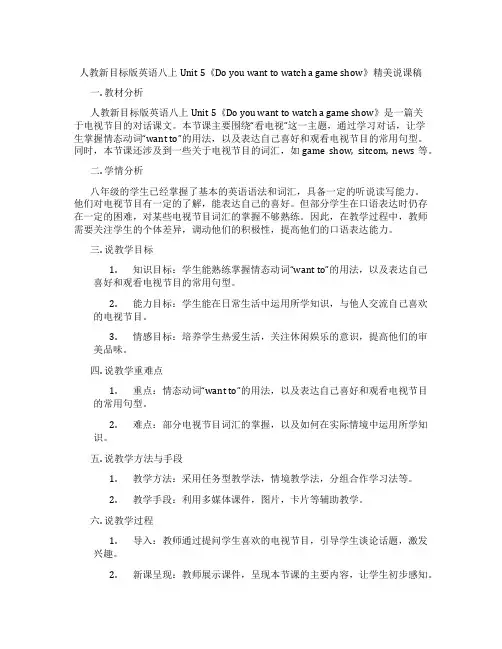
人教新目标版英语八上Unit 5《Do you want to watch a game show》精美说课稿一. 教材分析人教新目标版英语八上Unit 5《Do you want to watch a game show》是一篇关于电视节目的对话课文。
本节课主要围绕“看电视”这一主题,通过学习对话,让学生掌握情态动词“want to”的用法,以及表达自己喜好和观看电视节目的常用句型。
同时,本节课还涉及到一些关于电视节目的词汇,如game show, sitcom, news等。
二. 学情分析八年级的学生已经掌握了基本的英语语法和词汇,具备一定的听说读写能力。
他们对电视节目有一定的了解,能表达自己的喜好。
但部分学生在口语表达时仍存在一定的困难,对某些电视节目词汇的掌握不够熟练。
因此,在教学过程中,教师需要关注学生的个体差异,调动他们的积极性,提高他们的口语表达能力。
三. 说教学目标1.知识目标:学生能熟练掌握情态动词“want to”的用法,以及表达自己喜好和观看电视节目的常用句型。
2.能力目标:学生能在日常生活中运用所学知识,与他人交流自己喜欢的电视节目。
3.情感目标:培养学生热爱生活,关注休闲娱乐的意识,提高他们的审美品味。
四. 说教学重难点1.重点:情态动词“want to”的用法,以及表达自己喜好和观看电视节目的常用句型。
2.难点:部分电视节目词汇的掌握,以及如何在实际情境中运用所学知识。
五. 说教学方法与手段1.教学方法:采用任务型教学法,情境教学法,分组合作学习法等。
2.教学手段:利用多媒体课件,图片,卡片等辅助教学。
六. 说教学过程1.导入:教师通过提问学生喜欢的电视节目,引导学生谈论话题,激发兴趣。
2.新课呈现:教师展示课件,呈现本节课的主要内容,让学生初步感知。
3.讲解与练习:教师讲解情态动词“want to”的用法,以及表达自己喜好和观看电视节目的常用句型。
学生进行分组练习,巩固所学知识。
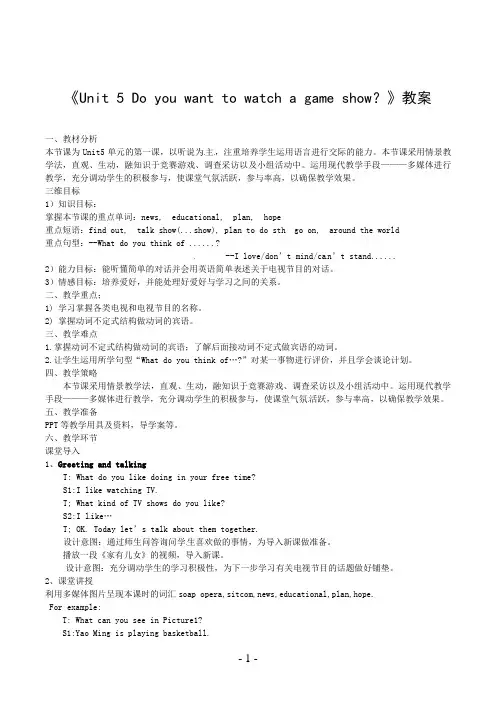
《Unit 5 Do you want to watch a game show?》教案一、教材分析本节课为Unit5单元的第一课,以听说为主,注重培养学生运用语言进行交际的能力。
本节课采用情景教学法,直观、生动,融知识于竞赛游戏、调查采访以及小组活动中。
运用现代教学手段———多媒体进行教学,充分调动学生的积极参与,使课堂气氛活跃,参与率高,以确保教学效果。
三维目标1)知识目标:掌握本节课的重点单词:news, educational, plan, hope重点短语:find out, talk show(...show), plan to do sth go on, around the world重点句型:--What do you think of ......?--I love/don’t mind/ca n’t stand......2)能力目标:能听懂简单的对话并会用英语简单表述关于电视节目的对话。
3)情感目标:培养爱好,并能处理好爱好与学习之间的关系。
二、教学重点;1) 学习掌握各类电视和电视节目的名称。
2) 掌握动词不定式结构做动词的宾语。
三、教学难点1.掌握动词不定式结构做动词的宾语;了解后面接动词不定式做宾语的动词。
2.让学生运用所学句型“What do you think of…?”对某一事物进行评价,并且学会谈论计划。
四、教学策略本节课采用情景教学法,直观、生动,融知识于竞赛游戏、调查采访以及小组活动中。
运用现代教学手段———多媒体进行教学,充分调动学生的积极参与,使课堂气氛活跃,参与率高,以确保教学效果。
五、教学准备PPT等教学用具及资料,导学案等。
六、教学环节课堂导入1、Greeting and talkingT: What do you like doing in your free time?S1:I like watching TV.T; What kind of TV shows do you like?S2:I l ike…T; OK. Today let’s talk about them together.设计意图:通过师生问答询问学生喜欢做的事情,为导入新课做准备。
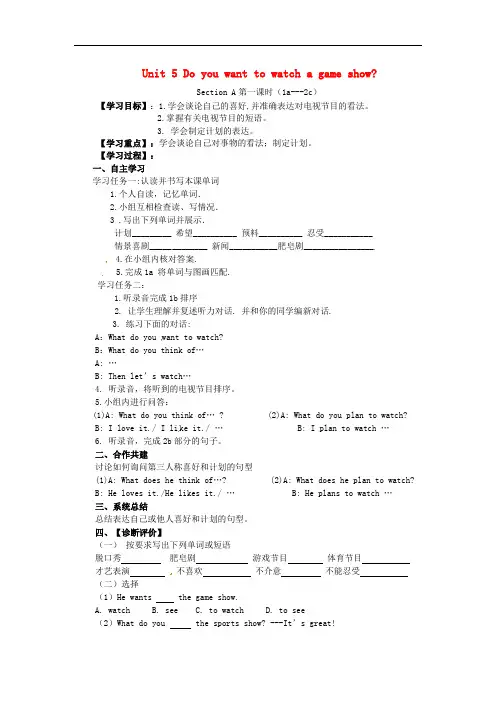
Unit 5 Do you want to watch a game show?Section A第一课时(1a---2c)【学习目标】:1.学会谈论自己的喜好,并准确表达对电视节目的看法。
2.掌握有关电视节目的短语。
3. 学会制定计划的表达。
【学习重点】:学会谈论自己对事物的看法;制定计划。
【学习过程】:一、自主学习学习任务一:认读并书写本课单词1.个人自读,记忆单词.2.小组互相检查读、写情况.3 .写出下列单词并展示.计划_________ 希望__________ 预料__________ 忍受___________情景喜剧_____________ 新闻___________肥皂剧________________4.在小组内核对答案.5.完成1a 将单词与图画匹配.学习任务二:1.听录音完成1b排序2. 让学生理解并复述听力对话. 并和你的同学编新对话.3. 练习下面的对话:A:What do you want to watch?B:What do you think of…A: …B: Then let’s watch…4. 听录音,将听到的电视节目排序。
5.小组内进行问答:(1)A: What do you think of… ? (2)A: What do you plan to watch? B: I love it./ I li ke it./ … B: I plan to watch …6. 听录音,完成2b部分的句子。
二、合作共建讨论如何询问第三人称喜好和计划的句型(1)A: What does he think of…? (2)A: What does he plan to watch? B: He loves it./He likes it./ … B: He plans to watch …三、系统总结总结表达自己或他人喜好和计划的句型。
四、【诊断评价】(一)按要求写出下列单词或短语脱口秀肥皂剧游戏节目体育节目才艺表演不喜欢不介意不能忍受(二)选择(1)He wants the game show.A. watchB. seeC. to watchD. to see(2)What do you the sports show? ---It’s great!A. thinkB. likeC. think ofD. look like(3)I the sitcom. It’s too long.A. likeB. don’t mindC. can’t standD. love(4)Can you help me what time the train leaves?A. find outB. look forC. watchD. see(5)I like watching news. I want to know what is around the world.A. go onB. goes onC. going onD. went on(三)补全对话A. the game showB. don’t likeC. aroundD. think ofE. interestingA: It’s time for news! Turn on the TV!B: What do you 1 news?A: I think it’s important. It can tell me what is goi ng on 2 the world.B: I 3 it. I think it is too boring.A: What do you plan to watch?B: Game show. It’s 4 .A: Ok. Let’s watch 5 after the news.(四)翻译下列句子1.我每天晚上看新闻。
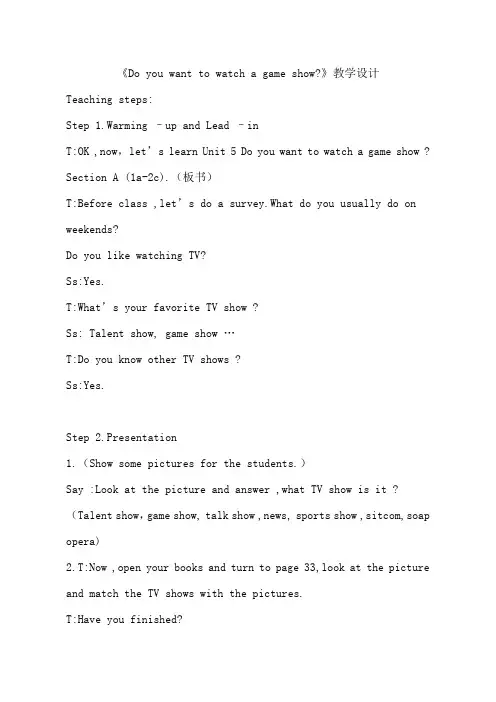
《Do you want to watch a game show?》教学设计Teaching steps:Step 1.Warming –up and Lead –inT:OK ,now,let’s learn Unit 5 Do you want to watch a game show ? Section A (1a-2c).(板书)T:Before class ,let’s do a survey.What do you usually do on weekends?Do you like watching TV?Ss:Yes.T:What’s your favorite TV show ?Ss: Talent show, game show …T:Do you know other TV shows ?Ss:Yes.Step 2.Presentation1.(Show some pictures for the students.)Say :Look at the picture and answer ,what TV show is it ? (Talent show,game show, talk show ,news, sports show ,sitcom,soap opera)2.T:Now ,open your books and turn to page 33,look at the picture and match the TV shows with the pictures.T:Have you finished?T:Then who can tell us your answer, hands up please.T:You ,please.S1: Talk show ,e;soap opera ,d;sports show ,b; sitcom ,c ;game show ,a;talent show,g; news,f.T:Sit down ,please.Yes or no?Ss:Yes.T:You did very well.Now ,read these phrases twice together.Talk show,do please.Step 3;ListeningListen and number the shows 1-4 in the order you hear them Check the answersStep 4.Pair work1.T: You did very well.Now,look at the screen.What do these faces mean?Ss:love,like,don’t mind,don’t like,can’t stand .2.show a cartoon picture with some pictures,and let students practice the conversation(1)T:Now ,class.What do you think of talent shows?(板书)Ss:Love.T:Yes.We can say “I love them .”Can you read the sentences ?T:Do it ,please.Ss:What do you think of talent shows ?I love them .(2)(展示第二幅图片,引导学生说句子。
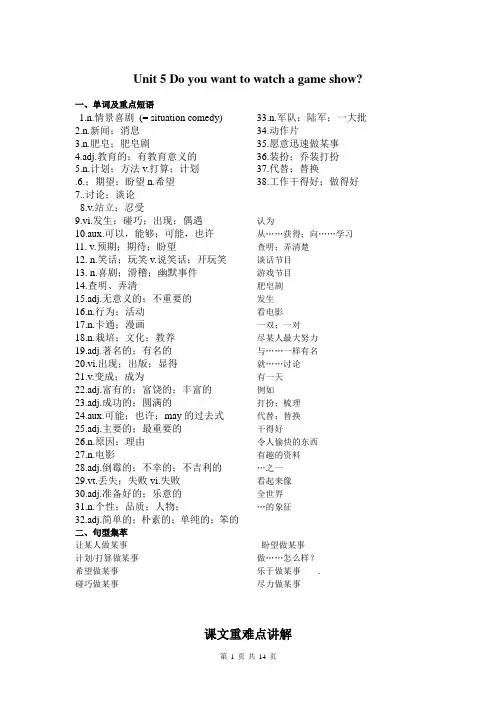
Unit 5 Do you want to watch a game show?一、单词及重点短语1.n.情景喜剧(= situation comedy)2.n.新闻;消息3.n.肥皂;肥皂剧4.adj.教育的;有教育意义的5.n.计划;方法v.打算;计划.6.;期望;盼望n.希望7..讨论;谈论8.v.站立;忍受9.vi.发生;碰巧;出现;偶遇10.aux.可以,能够;可能,也许11. v.预期;期待;盼望12. n.笑话;玩笑v.说笑话;开玩笑13. n.喜剧;滑稽;幽默事件14.查明、弄清15.adj.无意义的;不重要的16.n.行为;活动17.n.卡通;漫画18.n.栽培;文化;教养19.adj.著名的;有名的20.vi.出现;出版;显得21.v.变成;成为22.adj.富有的;富饶的;丰富的23.adj.成功的;圆满的24.aux.可能;也许;may的过去式25.adj.主要的;最重要的26.n.原因;理由27.n.电影28.adj.倒霉的;不幸的;不吉利的29.vt.丢失;失败vi.失败30.adj.准备好的;乐意的31.n.个性;品质;人物;32.adj.简单的;朴素的;单纯的;笨的33.n.军队;陆军;一大批34.动作片35.愿意迅速做某事36.装扮;乔装打扮37.代替;替换38.工作干得好;做得好认为从……获得;向……学习查明;弄清楚谈话节目游戏节目肥皂剧发生看电影一双;一对尽某人最大努力与……一样有名就……讨论有一天例如打扮;梳理代替;替换干得好令人愉快的东西有趣的资料…之一看起来像全世界…的象征二、句型集萃让某人做某事计划/打算做某事希望做某事碰巧做某事盼望做某事做……怎么样?乐于做某事 .尽力做某事课文重难点讲解Section A1. Do you want to watch a game show?【解析1】want =would like v 想要want a go = have a try 试一试(1) want sth 想要某物I want a pen.(2) want to do sth 想要去做某事I want to go home.(3) want sb to do sth = would like sb to do sth.想要某人做某事I really want __________________(去滑冰) today.【2014江苏盐城】69. The person who is the earliest will get what he or she _______(want).【2014苏州中考】The driver wanted___his car near the roadside but was asked by thepolice not to.A.ParkB. ParkedC. to parkD. parking【解析2】watch/read/see/look at “看”法不同(1)看电视、看比赛、看表演用watch; watch TV 看电视【2014重庆中考】27.—Where is your father?--He ________ the World Cup in the living room.A.is watchingB.watchesC.watchedD.will watch【2014江苏泰州】65. The TV program Super Brain(最强大脑)is so fantastic that it is well worth____ ( watch).(2)看书、看报、看杂志用read read the book看书(3)看电影、看医生用see see the doctor 看医生(4) 看黑板、看地图用look at look at the blackboard 看黑板【记】______the picture. Can you see the man in the picture? He isn’t ________ the book.He is ______TV.( ) ____ the board , child! Read the words on it after me.A. LookB. Look atC. SeeD. Watch【解析3】show ⑴v 出示,展示show sb. sth = show sth to sb. 向某人出示某物Lucy showed me her photos = Lucy showed the photos to me.show sb. around someplace 带领某人参观⑵n 演出;节目;表演be on show 正在展出fashion show 时装表演game show 游戏节目TV show 电视节目talent show才艺表演talk show 脱口秀;谈话节目sports show 体育节目( ) Zhang Xuan showed me her photos and gave me one yesterday.A. passed meB. brought meC. let me seeD. made me take【2014湖北武汉】38. I used to _______ with my wife and watch TV movies at home.A. show upB. wake upC. come upD. stay up2. —What do you think of talk show? 你认为访谈节目怎么样?—I don’t mind them . 我不介意它们。
说课稿Unit5DoyouwanttowatchagameshowGood morning/afternoon, everyone. Today, I would like to introduce a lesson plan on Unit 5, Do you want to watch a game show? The target language aims to help students develop their listening and speaking skills, as well as expand their vocabulary related to television programs.1. Lead-in (5 minutes)- Start the class by asking students if they like watching television programs. What are their favorite types of shows?2. Vocabulary introduction (10 minutes)- Pre-teach vocabulary words related to television programs, such as game show, soap opera, documentary, comedy, reality show, etc.- Use visual aids, real-life examples, and gestures to facilitate understanding and retention of the new words.3. Listening activity (20 minutes)- Play a short audio clip or video clip of a game show.- Ask students to listen carefully and answer questions about the show, such as the name of the show, the host, the format, and the contestants.- Conduct a brief class discussion to share the answers and encourage students to express their opinions on the show.4. Vocabulary practice (15 minutes)- Divide students into pairs or small groups.- Give each group a set of vocabulary cards.- In turns, students should take a card, read the word aloud, and ask their partner(s) to give a short explanation or example of the TV program.- Encourage students to use the new vocabulary words in their responses.5. Speaking activity (15 minutes)- Ask students to work in pairs and create their own game show.- Provide a list of prompts, such as the name of the show, the format, the type of questions, and the prizes.- Give students time to discuss and plan their ideas.- Ask a few pairs to share their game shows with the class and have other students provide feedback and suggestions.6. Wrap-up (5 minutes)- Summarize the main points of the lesson and review the new vocabulary words. - Ask students to reflect on what they have learned and how they can use these vocabulary words in their daily lives.In conclusion, this lesson plan on Unit 5, Do you want to watch a game show?, aims to enhance students' listening and speaking skills, as well as expand their vocabulary related to television programs. It provides opportunities for students to listen to and discuss different types of TV shows, practice using new vocabulary words, and create their own game shows. Thank you.。
Unit 5 Do you want to watch a game show? 全单元教案Period 1 Section A 1a-2cTeaching aims:Vocabulary:Words: sitcom, news, soap opera, cartoon, stand, plan, hope, happen, expect, meaningless, educationalPhrases: talk show, sports show, game show, soap opera, talent show, find out, think of…, plan to do,Target language:What do you think of talk shows?I love/ like/ don’t mind/ don’t like/ can’t stand them.A: What does she/he think of sitcoms?/ How does she/he like news?C: She/ He loves/ likes/ doesn’t mind/ doesn’t like/ can’t stand them/ it.Ability aims:1. Students will be able to discuss their preferences.2. Practice students’ listening skill.Emotional aims:Ss will learn to share their preferences to each other..Teaching important points:Words and target language.Teaching difficult points:Target language.Teaching procedures:Step 1 Warming up and review.Step 2. New word presentation:1. T: Do you like watching TV? S: Yes, I like2. Show some videos on the screen and ask some students to read the TV shows.T: What kind of TV show is it? S: It’s a sitcom.Teach: game show, talk show, talent show, sports show, sitcom, soap opera, news,3. Give Ss some time and try to remember the new words and expressions.Step 3 . Work on 1a.1. Ss read the activities and look at the pictures. Then match the activities with pictures.2. . Check the answers with Ss.Step 3:1bT: Jack and Mark plan to watch TV tonight. Now they’r e talking about the TV shows. What TV programs are they talking about? Open your books and P33. Look at 1b.1.Listen and number the shows in the order you hear them., then check.2. What does Jack think of these TV shows? Listen again and fill in the blanks.Jack doesn’t mind talk shows. He thinks sometimes they can be a bit boring . He usually can’t stand talent shows. But he thinks that one is quite funny .3. Check the answers.Step 4: New language presentation1. T: I’m free tonight. I plan to(计划)watch TV for an hour.I love talent shows. I like soap operas and talk shows. I don’t mind sitcoms.I don’t like game shows and news. I can’t stand sports shows. So, I want to watch China’sGot Talent (中国达人秀) tonight.What about you? What do you think of these TV shows?2. Practice:What do you think of game shows? Why?--I love them. Because they’re interesting.--I don’t like them. Because they’re meaningless.(let students know the meaning of the faces.)T: Do you know some other description words?SS: interesting, exciting, relaxing, enjoyable, funny, wonderful, educational有教育意义的fantastic, meaningless 毫无意义的, boring, terrible …Step5: 1c Pair work:T: Now let’s practice the conversation, then make your own conversations.e.g. A: What do you want to watch tonight?B: What do you think of talk shows/ …?A: I like them. I think they’re educational/…B: Then let’s watch a talk show/…Step 6 Work on 2a:1. Read the shows in the box of 2a. Tell Ss to remember the information.2. Play the recording for the Ss to listen and number the TV shows [1-5].3. Play the recording again to check the answers.Step 7 Work on 2b:1. Let Ss read the sentences below. Explain some main sentences for the Ss. Make sure theyknow what to do.2. Play the recording for the Ss to write the correct words in the blanks.3. Play the recording again to check the answers.Step 8. Summary:Key and difficult points are shown above.Teaching designStepⅥPeriod 2 Section A (2d-3c)Teaching aims:Vocabulary:Words: discussion; stand; happen; may; expect; joke; comedy.Target language:Do you want to watch the news? Yes, I do./No, I don’t.What do you plan to watch tonight? I plan to watch Days of Our Past.What can you expect to learn from sitcoms? You can learn some great jokes.Why do you like watching the news?Because I hope to find out what’s going on around the world.What do you think of talk shows?I don’t mind them./I can’t stand them!/I love watching them!Ability aims:1. Students will be able to discuss their preferences.2. Practice students’ reading and speaking skills.Emotional aims:Ss will learn to share their preferences to each other..Teaching important points:Words and target language.Teaching difficult points:Target language.Teaching procedures:Step 1 Warming up and review.Ask and answer questions about the different shows.What do you think of news?I can’t stand it. / I like it. / I don’t mind it. I…Step 2 role-play.1. Read the conversations and match the name with the right shows.① Grace a. game shows and sports shows② Sarah b. soap operas③Grace’s classmates c. news and talk shows2. Explain some new words and main points in the conversation.3. Re ad the conversation after the teacher.4. Practice the conversation with their partner. Then let some pairs to act out the conversation. Step 3 Grammar.1. read grammar and do some explaining.动词不定式的形式:to + 动词原形Jack wants to buy some flowers for Mr. Wu.杰克想给吴老师买些花。
人教版八年级上册英语Unit 5 Do you want to watch a game showSection B 2a-2e英文教案I. Teaching Objectives1. Language skills:Students will be able to understand and describe the information about Micke y Mouse in the reading passage.Students will be able to answer the questions related to the passage accurately.Students will be able to write their own sentences or questions using the learned phrases.2. Knowledge objectives:Students will learn the history and significance of Mickey Mouse.Students will master some key phrases and expressions related to cartoons.3. Emotional objectives:Inspire students' interest in English learning through the topic of cartoons.Cultivate students' awareness of cultural symbols and their positive values.II. Teaching Key Points1. Help students understand the main idea and details of the reading passage abo ut Mickey Mouse.2. Guide students to master the key phrases and expressions such as "come out ", "be ready to do", "try one's best".III. Teaching Difficult Points1. Enable students to analyze the reasons for Mickey Mouse's popularity and its s ymbolic meaning.2. Encourage students to express their own opinions and ideas in English about c artoon characters and cultural symbols.IV. Teaching Methods1. Task-based teaching method: Design various tasks to help students complete t he reading comprehension and language output.2. Communicative teaching method: Encourage students to have discussions and exchanges in pairs or groups to improve their oral communication skills.3. Contextual teaching method: Create vivid language contexts to help students u nderstand and apply the learned knowledge.V. Teaching ProcedureStep 1: Warm-up (5 minutes)1. Begin the class by showing some pictures of different cartoon characters, inclu ding Mickey Mouse, and ask students: "Do you like to watch cartoons? What is your f avorite cartoon? Why do you like it?"2. Invite several students to share their answers and have a brief interaction.Step 2: Pre-reading (5 minutes)1. Present the questions in 2a on the PPT and ask students to discuss them with t heir partners.2. After the discussion, randomly select some pairs to share their ideas.Step 3: While-reading (15 minutes)1. First readingAsk students to read the passage quickly and complete the timeline on 2b.Check the answers together.2. Second readingHave students read the passage again carefully and fill in the information abou t Mickey Mouse in 2c.Invite students to come to the blackboard to write down their answers and corr ect them together.3. Third readingAsk students to read the passage for the third time and discuss the questions i n 2d with their partners.Call on some pairs to share their discussions.Step 4: Post-reading (10 minutes)1. Have a summary of the passage with students, emphasizing the key points such as the history, popularity reasons, and symbolic meaning of Mickey Mouse.2. Ask students to think about what cartoon character can be a symbol of Chinese culture and why. Encourage them to express their opinions freely.Step 5: Language Practice (5 minutes)1. Show the phrases learned in this section on the PPT, such as "come out", "be r eady to do", "try one's best".2. Ask students to make their own sentences or questions using these phrases.3. Share some students' works and give feedback.Step 6: Homework (5 minutes)1. Ask students to write a short passage about their favorite cartoon character, inc luding its appearance, story, and why they like it.2. Encourage students to search for more information about Mickey Mouse or ot her cartoon characters and share it with the class next time.Example sentences:I like cartoons. They are enjoyable.John likes talk shows because they are relaxing.。
Unit 5 Do you want to watch a game show?Section A 1 (1a-2d)(Two periods)一、教学目标:1. 语言知识目标:1) 能掌握以下单词:sitcom, news, soap, educational, plan, hope, find out, discussion, stand, happen, may, expect能掌握以下句型:① What do you want to watch?② What do you think of talk shows?③ I can’t stand them.④ I don’t mind them.⑤ I like/love them. / I don’t like them.2) 能了解以下语法:动词不定式结构做动词的宾语;后面接动词不定式做宾语的动词。
3) 学会陈述自己的看法;学会谈论自己的喜好。
2. 情感态度价值观目标:学会谈论流行文化,了解各类电视和电视节目的名称和自己的喜欢。
注意引导学生们形成正确的文化观念,大力培养学生们的跨文化意义,形成自己独立的个性。
二、教学重难点1. 教学重点:1) 学习掌握各类电视和电视节目的名称。
2) 掌握动词不定式结构做动词的宾语;了解后面接动词不定式做宾语的动词。
2. 教学难点:掌握动词不定式结构做动词的宾语;了解后面接动词不定式做宾语的动词。
三、教学过程Ⅰ. Lead-in学生们根据图片提示学习各类电视节目并且练习运用What do you think of…? Ⅱ. Languague points and new wordsWhat do / does sb. think of ...?与How do / does sb. like ...?同义,用来询问对某事物或某人的观点或看法,意为“某人认为……怎么样?”;回答时可用love, like, not mind, not like, not stand等来表达对某事物或某人的好恶程度。
sitcom n. 情景喜剧news n.新闻节目; 新闻soap opera 肥皂剧Ⅲ. Game1. 引导学生们看1a中的图片,根据提示依次说出每一部TV Show的名称。
2. 让学生们看图片及1a中的词汇,将图片与正确的词汇相连。
3. Check the answers with the Ss.Ⅳ. Listening1. T: Tell Ss to read the shows in the box. Make sure they know the meaning of theshows.2. Play the recording for the Ss to listen and number the shows1-4.1b Listen and number the shows [1-4] in the order you hear them.__ talent show __ talk show __ soccer game __ news3. Play the recording again.Listen again and answer the questions. Remember the questions first.1) What does Mark plan to do later?2) What does Jack think of talk shows?3) Does Jack like the news?4) What does Jack think of talent shows?5) Does Mark want to watch the soccer game at 5:00? How about Jack?4. Play the once more. Check the answers with the Ss.Ⅴ. Pair work1. Let Ss look at the pictures in the box. Then explain the meaning of each expression to the Ss.2. Let Ss read the conversation after the teacher. Then let Ss make their ownconversation using the shows and expressions in the box.1c Practice the conversation. Then make your own conversations.A: What do you want to watch?B: What do you think of talk shows?A: They’re OK. I don’t mind them.B: Then let’s watch a talk show.3. Let some pairs ask and answer about the shows.A: What do you want to watch?B: What do you think of sports shows?…Ⅵ. ListeningWork on 2a:1. Look at the picture and answer the questions.1) Where are they? What are they doing?2) What are they probably talking about?2. Read the shows in the box of 2a. Tell Ss to remember the information.___ sitcoms ____ news___ game shows ____ talk shows___ soap operas2. Play the recording for the Ss to listen and number the TV shows [1-5].Listen to Lin Hui and Sally’s conversation. Number the TV shows [1-5] in the order you hear them.___ sitcoms ____ news___ game shows ____ talk shows___ soap operas3. Play the recording again to check the answers.Work on 2b:Listen again. Complete the sentences.1) Sally likes to watch _______________________.2) Lin Hui thinks she can learn ______ ___________ from sitcoms.3) Sally thinks ___________ are more educational than sitcoms.4) Sally loves __________. She plans to watch Days of Our Past _______.1. Let Ss read the sentences below. Explain some main sentences for the Ss. Make surethey know what to do.2. Play the recording for the Ss to write the correct words in the blanks.3. Play the recording again to check the answers.4. Listen once more then answer the questions.1)What does Lin Hui think of sitcoms?2) Does Sally like sitcoms? Why?3) What kind of TV shows does Sally like?4) What does Sally think of soap operas?5) What does Sally plan to watch tonight?Ⅶ. Pair work1. Tell Ss ask and answer questions about the TV shows in 2a. They can use the information that is true for them.2. Let Ss read conversation after the teacher.A: Do you plan to watch the news tonight?B: Yes. I like watching the news. I watch it every night.A: Why?B: Because I hope to find out what’s going on around the world.3. Explain some main points for the Ss.4. Ss act the conversation in pairs. Ask some pairs to act out their conversations.Ⅷ. Role-play1. Read the conversations and match the name with the right shows.① Grace a. game shows and sports shows② Sarah b. soap operas③ Grace’s classmates c. news and talk shows2. Read the conversation and answer the questions.1) What are Grace and Sarah talking about?2) What does Grace think of game shows and sports shows?4) What does Grace think of soap operas? What does Sarah think of them?5) What are Sarah’s favorite TV shows? Why does Grace think of them?3. Explain some new words and main points in the conversation.4. Read the conversation after the teacher.5. Practice the conversation with their partner. Then let some pairs to act out the conversation.IX. Language points1. educational adj. 教育的;有教育意义的education (教育) + al →educational; 多音节形容词,其比较级及最高级形式在其前加more,most构成。